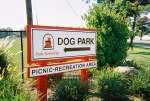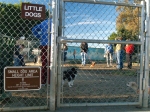There are ma ny things to consider when making the decision to adopt a dog or puppy; what supplies you will need, choosing a veterinarian, selecting a good food, and how you will socialize them. Many new and veteran dog owners immediately think of dog parks as the perfect way to exercise and socialize their dog-but are dog parks the right choice for your pooch?
ny things to consider when making the decision to adopt a dog or puppy; what supplies you will need, choosing a veterinarian, selecting a good food, and how you will socialize them. Many new and veteran dog owners immediately think of dog parks as the perfect way to exercise and socialize their dog-but are dog parks the right choice for your pooch?
There are both advantages and disadvantages to going to a dog park, and deciding whether your pet is suited for this kind of dog-to-dog interaction should be evaluated thoroughly to ensure that this will benefit his socialization skills rather than hinder them.
Would my dog enjoy going to the dog park?
When considering taking your dog to a dog park, owners should first evaluate their dog on a few different levels, such as age, play style, health, and their overall temperament.
Age: Puppies under 4 months of age should never go to a dog park as their immune systems are more susceptible to illness. Dogs that have reached maturity (generally around 2 years) and elderly dogs are more selective with their friends and may not be as outgoing or welcoming as they were when they were puppies. When introducing your mature dog to new friends, you should always proceed slowly and not assume that because your pooch has other doggie friends that he would appreciate being thrown into a new situation with a large number of “strangers”.
Play style: Different breeds of dogs have very different styles of playing, and you should evaluate the other dogs in the park at the time you arrive to see if your baby would fit in. For example, if the majority of the park patrons are large breed dogs that like to body slam each other (i.e., Labradors), then it may not be the best time to bring in your Australian Shepard who has a more reserved play style.
Health: Dogs who have had any communicable health issues in the past 30 days should not go to dog parks. It is always a good idea to visit your veterinarian beforehand to ensure that your dog is healthy enough to go to dog parks. Official dog parks should always have posted signs requiring that all dogs that enter the play area must be vaccinated; make sure that your pooch is up-to-date on his Rabies, Distemper/Parvo, and Bordetella shots (for more information on Canine Cough, see our post here). Dog park regulations also usually stipulate that all dogs over a certain age (usually 6 months) must be spayed or neutered to use the park, however, just because these rules are posted does not mean that all pet owners will adhere to them, keep this in mind when deciding if your pet should attend play time at the park. If you notice intact males or a dog whose health is questionable, do not use the park at that time.
Temperament: Dogs who have not been socialized should be integrated into the dog park slowly, and not at a time when there are a lot of dogs; one fight or bad experience can traumatize your dog. Remember, what we as the owner might think of as a minor event can often color your dog’s future reactions to similar situations. If you ha ve a small breed dog, find a dog park that provides two or more separated areas, one for larger dogs and one for smaller dogs. Often times larger breeds will over power the weaker dogs thus teaching the smaller dog to be afraid of larger dogs if the owner does not step in to correct the behavior. Also, there is the risk that a smaller dog will get stepped on and injured if not properly supervised. If your dog has issues with aggression, either towards other canines or towards humans, do not take them to a dog park. Similarly, do not take your nervous/anxious dog to the dog park either, this will not help them overcome their issues, just exacerbate them. Beginning socialization in both of these instances should only be attempted with the help of a professional trainer.
ve a small breed dog, find a dog park that provides two or more separated areas, one for larger dogs and one for smaller dogs. Often times larger breeds will over power the weaker dogs thus teaching the smaller dog to be afraid of larger dogs if the owner does not step in to correct the behavior. Also, there is the risk that a smaller dog will get stepped on and injured if not properly supervised. If your dog has issues with aggression, either towards other canines or towards humans, do not take them to a dog park. Similarly, do not take your nervous/anxious dog to the dog park either, this will not help them overcome their issues, just exacerbate them. Beginning socialization in both of these instances should only be attempted with the help of a professional trainer.
Choosing the right Dog Park
So you’ve decided you want to take Fido to the dog park, which one do you choose? Picking the right dog park is as important as deciding if your do g would do well in one and the correct set up will help your dog integrate into the pack better. Always choose an area that is specifically zoned as a dog park, NOT your local field or other open space as there may be regulations against having dogs off-leash in these areas and not be fully enclosed.
g would do well in one and the correct set up will help your dog integrate into the pack better. Always choose an area that is specifically zoned as a dog park, NOT your local field or other open space as there may be regulations against having dogs off-leash in these areas and not be fully enclosed.
Look for parks that have at least two gated entrances and that are preferably shielded from the view of the dogs that are already inside. Dog patrons will tend to gather around the entrances and can cause anxiety and a higher state of arousal in the incoming dog, creating a higher risk for an incident to break out. Do not force your dog to enter the park if they seem nervous or anxious; the other dogs will be able to pick up on their energy and try to control the situation by going after the dog whose energy is ‘off’.
Parks with a large space to run are best so that dogs who do not wish to interact with the others are not forced to due to proximity. Ponds, lakes, trees, and hillocks are good features to look for not just for the dog’s enjoyment, but also to prevent them from racing full speed towards other dogs and potentially colliding with each other. Other structures or obstacles are a plus for frightened dogs that wish to hide or keep to themselves.
Dog Park Basic Do’s and Don’ts
Do:
- Clean up after your dog.
- Supervise your dog at all times and interrupt interactions if they are inappropriate or too rough. Remember, you are responsible for your own dog’s actions, there are not dog park workers there to take care of your dog for you.
- Exit the park if your dog is being bullied/your dog is bullying others.
- Bring one person per dog.
- Adhere to and respect all posted signs and regulations.

- Move around the park; don’t separate yourself too far from your dog.
Don’t:
- Bring toys or treats, these can cause guarding and aggression between the dogs.
- Allow dogs to bully others.
- Talk on your phone or form a group with the owners and ignore your dog.
- Bring children, they can easily be knocked over and you do not know how other dogs will react to them.
- Take advice from dog park patrons unless they are trained dog professionals.
Dog Park Alternatives
If your pet is not suited to dog parks or you are uncomfortable having them around dogs whose temperament you are unsure of but you are intent on having them socialized, then Doggie Daycare would be better fit for both you and your dog. While doggie daycare is not free, the peace of mind owners receive from knowing that their pet is being supervised by trained professionals and is playing with dogs who have been pre-approved and temperament tested in order to be in a group setting makes up for the financial cost. Another advantage to doggie daycare is knowing that the facility has requirements for health, vaccinations, and spaying or neutering that all the dogs must adhere to in order to be allowed in the door. However, just like choosing a dog park, you must do your due diligence and choose the pet care facility that adheres to the highest standards of cleanliness, care, and safety.
There are a lot of good suggestions in this article on dog parks, but what jumped out at me was the suggestion to not take advice from other park patrons unless they are a professional dog handler.
I’m no professional, but I’ve kept Lab retrievers for close to 40 years. I learned a lot from other non-professional dog handlers over the years, so I do my best, when the situation arises, to pass along some of what I have learned. That’s what people do in a community – share information.